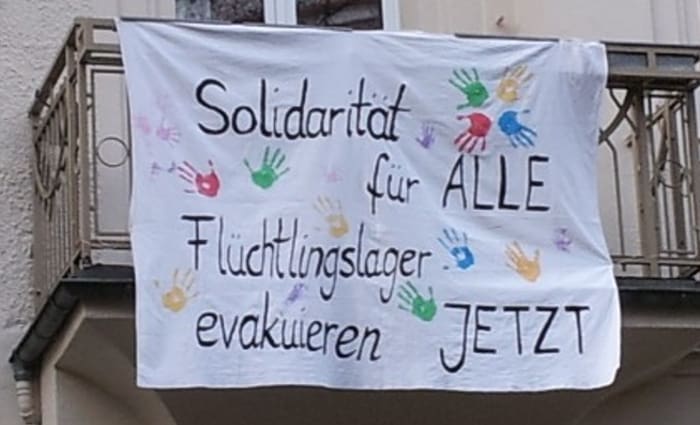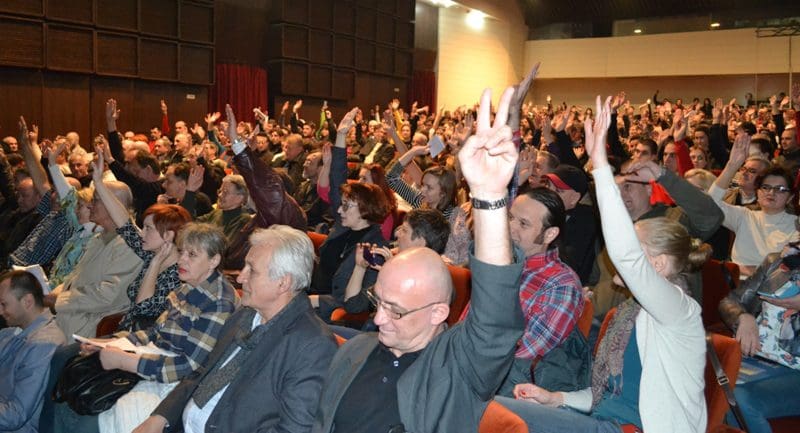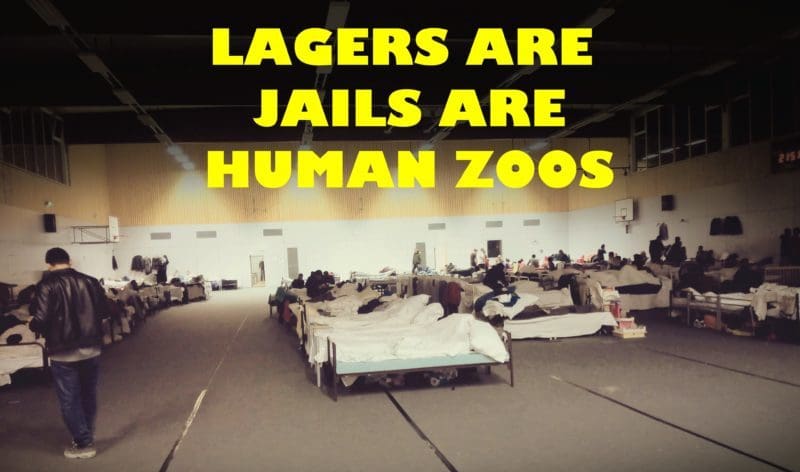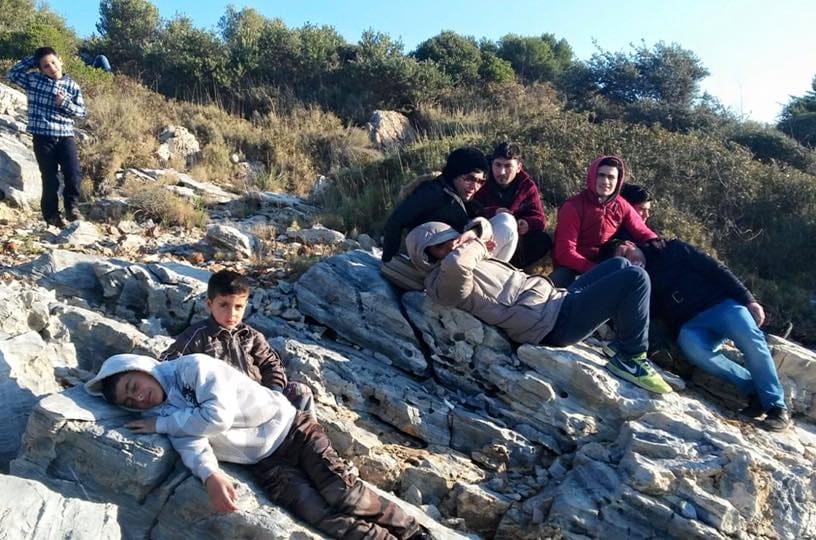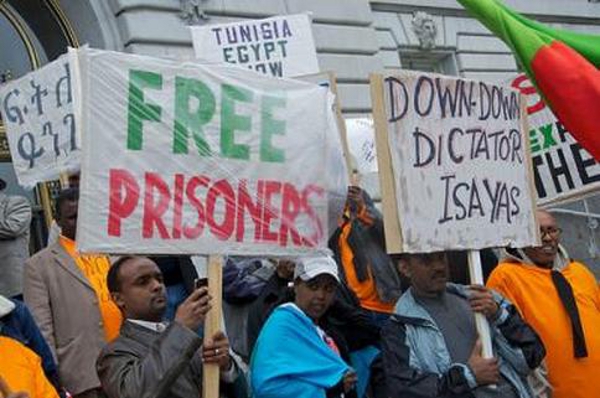AntiNote: As large legacy media outlets slowly start to attend to the human cost of the current pandemic by naming and profiling frontline workers and others who the virus has affected (or taken) besides society’s “notables,” we were not surprised to discover that autonomous radical social movements have also mobilized to go a step further by collecting and sharing testimony from people even deeper in the shadows of colonial capitalist patriarchal society. This is, of course, where people are also most vulnerable. We hope soon to be sharing assessments of the situation among displaced people in the north of Syria as well. Solidarity and strength to the Navajo Nation in the so-called US and all other high-risk Indigenous populations resisting colonial erasure in this perilous time. We wish everyone reading this health and safety.
Break the Silence!
Corona Reports from Inside Berlin’s Refugee Shelters
by the Break Isolation Group (BIG) of the International Women* Space (Berlin)
2 April 2020 (original posts)
In such spaces, social distancing as recommended by the health administration is simply not possible in practice.
– Break Isolation Group (BIG)
The International Women* Space (IWS) is publishing Corona Lager Reports. These are audio reports and testimonies about the current situation in the refugee lagers, heims, and reception centers in Brandenburg, given by women who are living in these places. We invite you to listen to these reports, or read the transcripts, and we encourage you to publish and share them.
Due to the fact that the lagers are located in remote places, access to information is often delayed, unavailable, or inadequate—and we practically never hear anything from the inside. In the current situation with the threat of the Coronavirus, this scenario is deadly. In such a pandemic, the immediate ability to act and the rapid implementation of instructions and measures around behavioral changes are vital for survival. Equally important is the continuous evaluation of these measures and reporting on them to ensure their effectiveness.
The Corona Lager Reports aim to accomplish this task and reveal the realities of impossible social distancing, inadequate or completely missing hand-washing facilities, compulsory quarantine, and the intense fear among the inhabitants of these lagers.
The Corona Lager Reports were initiated by the Break Isolation Group (BIG) of the International Women* Space. BIG is a self-organized group of refugee women that was formed in February 2019 as a result of the quest to share their own experiences as refugees in Germany, in their own voices.
In order to prevent the deadly spread of Coronavirus in the camps and in Brandenburg:
- We demand the immediate closure of lagers.
- We demand the distribution of all women and refugees to safer accommodation.
- We demand equal treatment of all humans regardless of their social status and race without any form of discrimination.
These voices need to be heard. Help us break the silence! Please share and spread these reports.
Women from the IWS Break Isolation Group report on the situation in the lagers
The location of the so-called “heims” in different parts of Berlin and Brandenburg is purposefully structured by the state – far away and closed off from Berlin’s central infrastructure. Access to vital information with regards to the asylum process is extremely limited. Isolated in such remote accommodation, with minimal or no connection to reliable sources of information in a time when there is a great need to be well-informed, these women are not only denied this, but their basic human rights are being violated. Most of these accommodations have very weak internet, if they have access at all, and women staying there cannot afford to buy data for their phones with the money they receive from the state.
The BIG women continually seek to break this form of isolation by visiting these places to inform and encourage through sharing their personal experiences, and to educate and exchange information to empower and to build the capacity of these women to ultimately self-organize to seek and demand that their basic and fundamental human rights are met. Through these visits, the group strengthens links and enhances connections to other organizations and self-organized groups in Berlin that provide services to refugees and migrants – for example by distributing printed materials and information sheets from these partners translated in different languages.
Measures being taken to slow the spread of the Coronavirus have further restricted access to these accommodations. But the International Women* Space—and specifically the refugee women of the Break Isolation Group—continue to reach out to women during this period, women who are not only isolated and locked up but lack access to the ever-evolving and rapidly-emerging information about the ongoing pandemic. It can be very challenging for women in these accommodations, and this situation can easily aggravate psychological and physical health issues – issues that were already present following their personal reasons for fleeing and seeking protection and a safe haven in Germany.
In an effort to continue the work of sharing experiences and reaching out to and engaging with women, the BIG women have initiated the Corona Lager Reports. They are recording audio messages on the current situation in different accommodations, and invite other women to share their experiences too.
You can listen to the reports all in one place, where you will also find a transcript of the recording in English and a translation in German. Below are two short samples.

Corona Later Report #3
1 April 2020
Hello, this is the update from Doberlug-Kirchhain about Corona. Just like in Eisenhüttenstadt, they provide handwashing facilities in the cafeteria where we eat; you have to wash your hands with soap before you eat and there is a social distance of one and a half meters in the queue. But in the bathrooms and toilets there is no soap, so if you need to wash your hands, you have to go with your own soap. But they try to do their best about the cleanliness in the bathrooms and in the toilets. On the other hand, because of this outbreak, the buses which used to take people to the market stopped running. When we asked about it, we were told that the bus will be available again once the epidemic goes down. If you want to go to the market now, you have to walk all the way.
The other thing is that staff members in the clinic have been reduced; they have also reduced the number of social workers and kitchen staff. As a result, the services that we were used to getting—for example, meals have been reduced because they don’t have enough staff to handle so many people at once.
When it comes to the measures to try to control the spread of the disease, when people are coming from outside the facility, wherever they are coming from, if they have not been in the compound in the last twenty-four hours, they are put in isolation and tested. Only when the test results come – which takes about one week – will they be released to go and mix with other people. The only people who will be handling them will be doctors or nurses; they are the ones who bring the meals while they are isolated. The nurses and doctors try to protect themselves: they put on their personal protective equipment and they handle them as if they are already infected. Once the results come out, they are released.
When it comes to any place you are being served they try to avoid touching anything that we have touched. For example they will not touch your ID, they will not touch your plastic card – you just show them from far. Even when you need to get your money you will stand far away from them. They don’t give you a paper to sign, because then they would need to touch the paper that you touched. You just give your signature electronically and then they give you your cash.
Information in different languages is available. It is posted in the cafeteria and in the entrance of every building of the facility. So everybody is able to access information in their own language.
If they tell you to go for treatment and you try to resist, they will call the police to come for you and take you to treatment by force. If they suspect that you have a fever, even if it is not confirmed positive, if you have mild symptoms – the fever, the headache – and they tell you to go to the hospital, and you refuse, they call the police and you will be arrested and taken to the hospital.
Corona Lager Report #6
4 April 2020
There is a heim in Treskow, out in Neuruppin. The biggest heim there, one that hosts around six hundred people, was closed for a week because some people were sick. So they are trying to bring people to other lagers to share rooms. People don’t understand. Even people who have jobs there – one euro jobs – have been given a one-week Residenzpflicht [mandatory residence order], so that they have to stay in the lager. And then they blocked insurance cards, so that you can only stay in Neuruppin and only go to the hospital in Neuruppin. People are very, very worried.
Then they wrote that women who have children could go to the Frauenhaus, the women’s shelter, to stay for the time being until they find a solution. There is no solution! People are worried because they are trying to fix people in one room. They have opened new lagers in Altneuruppin and Wusterhausen; they are squeezing people in one room, not knowing who is sick and who is not sick. It is not a good situation. People are worried.
I went there personally to visit a Cameroonian woman with two children. She called me and I was concerned; it was very painful. She got Residenzpflicht – just like that! She couldn’t move, and she was worried about the children: they are sharing showers and toilets with different people, and she was so worried. I went to listen to the information; I got it and went to the other lagers. I got the information so that I can share it with you people. We can see what we can do. It is scary, it is really not easy, people are worried.
The situation is not good. People don’t have information. According to what I understand, the people are not aware, in contrast to Berlin, where you can go to KUB or whatever to get information. Here there is no information, everything is closed because of Corona. Even getting money is a problem. You have to go to a certain office: you get a letter inviting you to go and get money – even people with children! You don’t go to the social center to get your money, they don’t even send the money to your account. People are worried because of Corona, but people don’t care about women. They are being moved here and there with their children, and this is horrible. You cannot imagine the situation – running here and there.
There is not much information. The Flüchtlingsrat [refugee council] is there, but they don’t help. It is closed. Everything is closed there. It is a village. It is closed. And they treat you bad, it is some kind of racism. They tell you: Stay two meters away from I don’t know what! I control everything! And it is not funny. You can say: Wait. They can tell you: Come to us later.
I will gather more information from other people. It’s really sad.
Featured image: Solidarity banner in Wiesbaden, Germany, demanding all refugee shelters be immediately evacuated.

